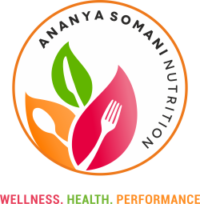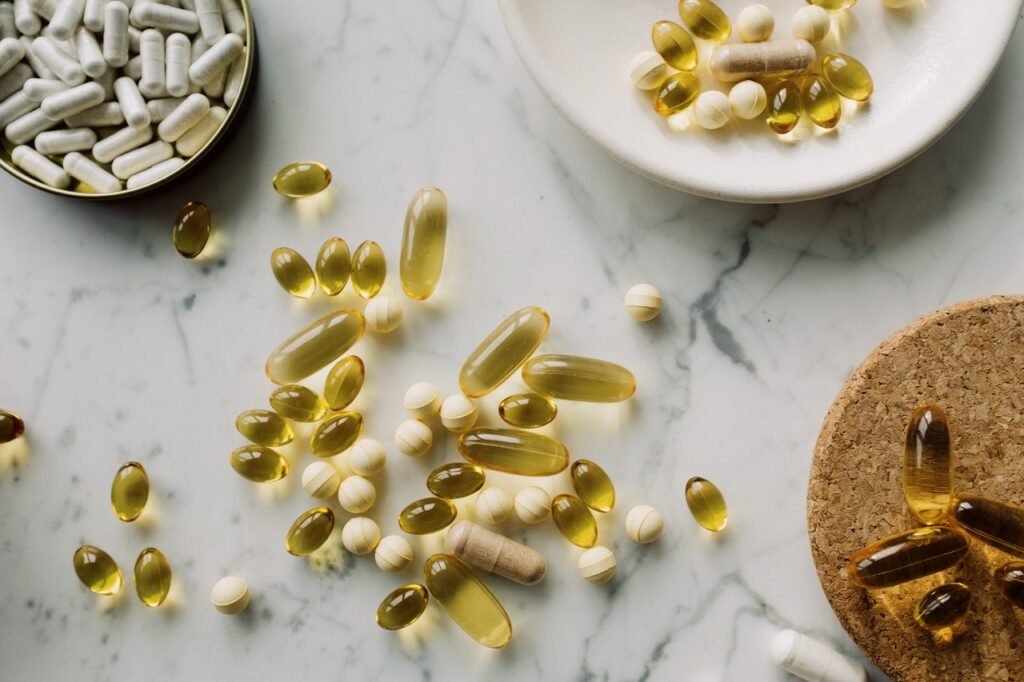Polycystic ovary syndrome (PCOS) is a hormonal disorder commonly seen among women of reproductive age, characterized by irregular periods, enlarged ovaries, insulin resistance, and physical signs such as excess facial and body hair (hirsutism), acne and male-pattern baldness. Lifestyle and nutrition habits can help manage PCOS (refer to our blog here) and certain supplements can be of benefit too. Although further research is required in this area, there is emerging evidence for the supplements listed below. Note, these cannot cure PCOS, but may help relieve the symptoms and combat deficiencies.
INOSITOL
Inositols are carbohydrates and are present in foods such as fruits, beans, grains, and nuts. There are two main types (myo-inositol and D-chiro-inositol) which are involved in the signalling pathway for key hormones in the body. With PCOS the balance of the two types of inositol can be disturbed and supplementation can help restore this and reduce insulin resistance, improve ovarian function, and reduce androgen levels.
Dosage: 2-4 g/day (if supplementing)
CINNAMON
Cinnamon (Cinnamomum verum) is obtained from the inner bark of several cinnamon tree species and has been used as a spice for thousands of years. Cinnamon can help in improving insulin sensitivity, reducing blood pressure, cholesterol and oxidative stress.
Dosage: 1.5 g/day (if supplementing)
CHROMIUM PICOLINATE
Chromium is a trace mineral. It is an extremely safe and highly tolerable trace mineral which is present in normal diet. It is present in whole grains, seafood, meat, broccoli, and brewer’s yeast. It is combined with picolinate acid in order to enhance gut absorption. Chromium picolinate is a trivalent chromium and helps in reducing insulin resist1ance and decreases hyperinsulinemia as well as hyperandrogenemia.
Dosage: 200 mcg/day
MAGNESIUM
Magnesium is an abundant mineral found in foods such as whole grains, legumes, nuts, seeds and green leafy vegetables. Women with PCOS have greater likelihood to have low serum magnesium levels. Magnesium can help improve insulin resistance and maintain blood glucose levels.
Dosage: 300-500 mg/day (if supplementing)
ZINC
Zinc is present in many different foods like organs and flesh of mammals, fish, eggs and dairy products, grains, nuts and legumes. Studies have shown that women with PCOS have reduced serum zinc concentration. Zinc plays a critical role in ovulation and fertilization and deficiency can disrupt the menstrual cycle. Zinc supplementation can help overcome deficiency, and relieve symptoms such as hair growth (hirsutism) in women with PCOS.
Dosage: 50 mg/day (if supplementing), else include food sources described
OMEGA-3 fatty acids
Omega-3 fatty acids are essential fatty acids that have to be consumed through food. Foods rich in omega-3s include fatty fish, walnuts, flax seeds and chia seeds. They can help decrease inflammation, testosterone levels and improve insulin resistance. In addition, omega 3 supplementation may help the menstrual cycle become more regular in women with PCOS.
Dosage: 1-3g/day (if supplementing), or can focus on food sources such as incorporating 2-3 serves of fatty fish/week
VITAMIN D
Vitamin D is a nutrient as well as a hormone that our body makes. A few foods that are naturally rich sources of vitamin D are fatty fish, fish liver oil, dairy products, egg yolks, and mushrooms. Vitamin D supplementation can help in reducing inflammation and benefit on ovulation.
Dosage: As per deficiency based on blood levels
This is not it, there are more supplement options such as N-acetylcysteine and berberine that may be helpful for women with PCOS. However, there is no ‘one size that fits all’ approach and what has worked wonders for someone else might not work at all for you. Moreover, there is much to be understood in this area, where research is ongoing. Eventually, the aim is to utilise supplements effectively to address specific concerns and gaps in one’s diet. And always, remember to check with your healthcare professional before starting any supplements.
This blog was contributed to by our intern, Karesna Mehta.
REFERENCES:
- Amooee, S., Parsanezhad, M. E., Ravanbod Shirazi, M., Alborzi, S., & Samsami, A. (2013). Metformin versus chromium picolinate in clomiphene citrate-resistant patients with PCOs: A double-blind randomized clinical trial. Iranian journal of reproductive medicine, 11(8), 611–618.
- Druckman, R. (2018). Management of women with PCOS using myo-inositol and folic acid. New clinical data and review of the literature. Hormone molecular biology and clinical investigation, 34(2), /j/hmbci.2018.34.issue-2/hmbci-2017-0067/hmbci-2017-0067.xml. https://doi.org/10.1515/hmbci-2017-0067
- Gupta Jain, S., Puri, S., Misra, A., Gulati, S., & Mani, K. (2017). Effect of oral cinnamon intervention on metabolic profile and body composition of Asian Indians with metabolic syndrome: a randomized double -blind control trial. Lipids in health and disease, 16(1), 113. https://doi.org/10.1186/s12944-017-0504-8
- Hamilton, K. P., Zelig, R., Parker, A. R., & Haggag, A. (2019). Insulin Resistance and Serum Magnesium Concentrations among Women with Polycystic Ovary Syndrome. Current developments in nutrition, 3(11), nzz108. https://doi.org/10.1093/cdn/nzz108
- Jamilian, M., Foroozanfard, F., Bahmani, F. et al. Effects of Zinc Supplementation on Endocrine Outcomes in Women with Polycystic Ovary Syndrome: a Randomized, Double-Blind, Placebo-Controlled Trial. Biol Trace Elem Res 170, 271–278 (2016). https://doi.org/10.1007/s12011-015-0480-7
- Jamilian, M., Foroozanfard, F., Rahmani, E., Talebi, M., Bahmani, F., & Asemi, Z. (2017). Effect of Two Different Doses of Vitamin D Supplementation on Metabolic Profiles of Insulin-Resistant Patients with Polycystic Ovary Syndrome. Nutrients, 9(12), 1280. https://doi.org/10.3390/nu9121280
- Kalra, B., Kalra, S., & Sharma, J. B. (2016). The inositols and polycystic ovary syndrome. Indian journal of endocrinology and metabolism, 20(5), 720–724. https://doi.org/10.4103/2230-8210.189231
- Kort, D. H., & Lobo, R. A. (2014). Preliminary evidence that cinnamon improves menstrual cyclicity in women with polycystic ovary syndrome: a randomized controlled trial. American journal of obstetrics and gynecology, 211(5), 487.e1–487.e4876. https://doi.org/10.1016/j.ajog.2014.05.009
- Lin, M. W., & Wu, M. H. (2015). The role of vitamin D in polycystic ovary syndrome. The Indian journal of medical research, 142(3), 238–240. https://doi.org/10.4103/0971-5916.166527
- Nadjarzadeh, A., Dehghani Firouzabadi, R., Vaziri, N., Daneshbodi, H., Lotfi, M. H., & Mozaffari-Khosravi, H. (2013). The effect of omega-3 supplementation on androgen profile and menstrual status in women with polycystic ovary syndrome: A randomized clinical trial. Iranian journal of reproductive medicine, 11(8), 665–672.
- Nasiadek, M., Stragierowicz, J., Klimczak, M., & Kilanowicz, A. (2020). The Role of Zinc in Selected Female Reproductive System Disorders. Nutrients, 12(8), 2464. https://doi.org/10.3390/nu12082464
- Yang, K., Zeng, L., Bao, T., & Ge, J. (2018). Effectiveness of Omega-3 fatty acid for polycystic ovary syndrome: a systematic review and meta-analysis. Reproductive biology and endocrinology, 16(1), 27. https://doi.org/10.1186/s12958-018-0346-x

